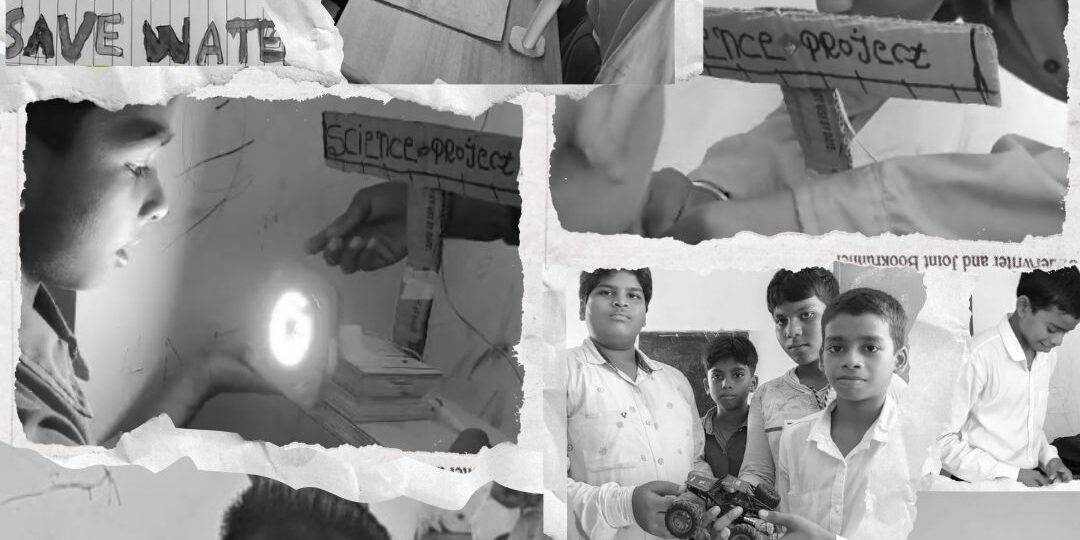Our small school may not have all the resources of larger institutions, but we have something far more valuable: a passion for learning and a system that works for me, my students, and everyone who enters my classroom.
While growing up, like any other child, I too was curious about everything around me, but what fascinated me the most was how things worked—the why behind a bird’s flight, the rainbow in the sky, or the simple magic of water turning into ice. Growing up in a middle-class family in Bihar, I didn’t have access to fancy laboratories or science kits in my school, but my father’s old radio and my mother’s kitchen utensils became my learning instruments. That sense of wonder is what I now aim to ignite in my students at the government school where I teach Science. Despite limited resources, I encourage them to ask questions, experiment with everyday objects, and find joy in the process of discovery. Watching them marvel at simple phenomena, just as I once did, gives me hope that they, too, will one day become the scientists and thinkers this country needs.
I have always believed in the transformative power of education. True education, I feel, brings humility, and through humility, we become worthy. As we encounter challenges and overcome them, we gain not just material wealth but also wisdom and happiness. This belief has guided me throughout my journey as a mathematics & science teacher at UMS Totahan.
When I took charge of the school from 2019 to 2022, I faced many challenges but also received immense support. During this time, I witnessed the impact of Project-Based Learning (PBL), especially as it brought my subjects to life during the pandemic. With the support of my students, fellow teachers, and parents, we transformed learning into an exciting adventure, even in difficult times.
For me, science is not just something to be studied in a textbook—it is something to be experienced. Through experiments, we find exact solutions to problems. I wanted my students to break free from traditional methods and explore science and mathematics through their curiosity. This is where PBL became a powerful tool, offering students the freedom to learn by doing.
In PBL, students are encouraged to select their own resources and experiments, which allowed me to observe their creative thinking and scientific inquiry. One project that truly stands out is “Meri Machine Meri Duniya.” (My Machine is My World )My students built a cart using old materials like plywood, toy wheels, and bed sheets. This cart, moved by simple mechanics, reflected the essence of NEP 2020—hands-on, innovative learning.
What made PBL so impactful was its ability to build holistic development—mentally, physically, and emotionally. My students were not just memorizing information; they were learning to apply knowledge in meaningful ways. The online and offline workshops and training sessions I participated in gave me the tools to guide them more effectively. The process of learning became a collaborative effort, with students and even parents becoming actively involved in school projects. Science and math, once intimidating subjects, became sources of curiosity and joy.
I came to understand that workshops and training are essential for continuous learning and development. The confidence I saw in my students as they tackled complex problems gave me immense hope. The skills they were developing—critical thinking, problem-solving, and communication—will serve them well, not just in their future careers but in everyday life, as highlighted by NEP 2020.
Our small school may not have all the resources of larger institutions, but we have something far more valuable: a passion for learning and a system that works for me, my students, and everyone who enters my classroom. I see the spark of curiosity in their eyes, and I know they will go on to make a difference, not just in India but wherever life leads them.
Ultimately, my wish for my students is that they continue to grow, both inside and outside the classroom. I want them to take pride in their teamwork, their ability to solve problems, and their social-emotional learning. They are the future, and I am honored to be part of their journey.
Project-Based Learning (PBL) is being implemented in Bihar through a collaboration with SCERT Bihar and Education Above All. Similarly, in Andhra Pradesh, PBL is gaining traction in schools under The Mahatma Jyotiba Phule Andhra Pradesh Backward Classes Welfare Residential Educational Institutions Society, also in collaboration with Education Above All. These initiatives aim to create more meaningful learning experiences, fostering critical thinking and real-world problem-solving skills.


